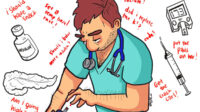We received hundreds of submissions for the 2021 BoardVitals Medical School Scholarship. Applicants were asked to answer the question “In what field do you think the next major advancement in medicine will occur?”
Our 1st place winner, Sanath Patil, is a current medical student. For his scholarship essay, he wrote about the technology behind robotic surgery and how it will impact the future of the healthcare industry. As our first-place winner, Sanath was awarded $2,500 to put towards educational expenses. Congratulations to Sanath and to all of our winners! Check out Sanath’s essay below.
Robotic surgery, a constantly developing technology, is being implemented today in many hospitals for surgeons to operate with remote accuracy. With complete precision in the operation and a reduced amount of stress for the patient, robotic surgery will be the future of surgery. The poster machine, the Da Vinci surgical system, is in two parts; one of them is a screen where the doctor can see from a camera at the place of the surgery and use his fingers to make small movements on the robotic hands on the second part. These small “hands” on the robot create less blood and smaller, more accurate incisions. Along with these, the whole surgery takes significantly less time to complete and allows a faster recovery period for the patient. The Da Vinci surgical system is a major technological advancement from current surgical performance.
During my first experience experimenting on the Da Vinci machine as a student, I realized the meticulousness and precision of this machine. As the pediatric urologist sat down across the room and peered into the large VR set, I saw the tiny pegs and grapes sitting on a table a few feet away peeled nearly perfectly. The slightest movement of her finger sent one of the arms above the operating table into action, manipulating the grape while her other finger meticulously peeled it. Concluding her lesson, she encouraged me to give it a shot. I eagerly grabbed the controls, but could not even touch the grape. Finally, I managed to pick up a grape, but peeling it was another story. This exposure to the forefront of robotic surgery shows me how pivotal these robots will be to the future of surgery and healthcare.
Along with these precise controls, the Da Vinci machine allows for quicker recoveries for patients, which benefit not only patients but also hospitals and physicians. These quicker recoveries mean less time spent in the hospital for patients and a lower overall complication rate.
In addition, remote surgery opens up a whole new avenue for innovation, including remotely performing surgery in areas of the world that are underserved and are in dire need of medical attention. A surgeon in one part of the world could operate on a patient in another part without having to travel to the patient.
Ultimately, the field of surgery, specifically the use of robotic surgery, is where the next major advancement in medicine will occur. The advantages of robotic surgery, which include quicker recoveries, a remote working area, and less error on the part of a surgeon all contribute to the reason why robotic surgery is the future of medicine. These advantages far outweigh the disadvantages of specialized training for surgeons and a high fixed cost of the machine.




